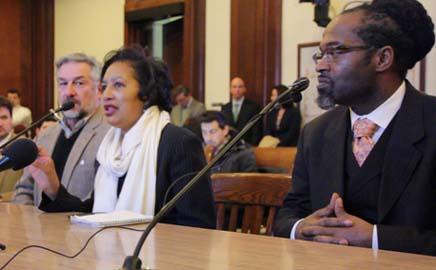March 18, 2014

Chris Douglass, of Ashmont Grill; Karen Henry-Garrett, of Dot 2 Dot Café; and Donnel Singleton, a Roxbury businessman, testified in favor of a bill to give Boston more control over liquor licensing. Photo by Mike Deehan, State House News Service
Boston pols and business people seeking to wrest control of restaurant liquor licensing from state lawmakers and a governor-appointed board told a legislative committee Tuesday that some neighborhoods are starved for nightlife.
“We need to return the liquor licensing process to the city of Boston. It’s simply a matter of fairness,” Boston City Councilor Ayanna Pressley told the legislative panel. She said, “This is not about converting main streets into New Orleans Bourbon Street. This is about recognizing that in order for an urban community to be healthy, it has to have a thriving main streets, and restaurants play a critical role in that.”
Pressley’s bill, which was supported by the Boston City Council 12-1, would allow the city’s licensing board to determine the number of licenses available, give the mayor and council the power to appoint the commission, and increase the number of commissioners from three to five. A 1906 law gives the governor authority over appointing the three-member board, and a state cap on the number of licenses means state lawmakers are constantly asked to approve additional licenses for alcohol sales in cities and towns.
After Tuesday’s hearing of the Committee on Consumer Protection and Professional Licensure, which has authority over liquor licensing bills, the two co-chairmen said they are open to reviewing the ad hoc method of approving additional licenses.
“It’s worth looking at,” House Chairman John Scibak, a South Hadley Democrat, told the News Service.
Senate Chairman Tom Kennedy, a Brockton Democrat, said, “It’s the system that we’re under right now . . . We have that on our agenda to review.”
Neither Scibak nor Kennedy could say whether Pressley’s bill, which was filed by Mattapan Democrat Rep. Russell Holmes, would receive a favorable report.
“We shouldn’t have to leave our neighborhoods to really get to fine dining,” said Holmes, who said Roxbury and Mattapan are the only neighborhoods in Boston where the number of liquor stores outnumbers the number of restaurants with alcohol licenses.
Massachusetts Restaurant Association lobbyist Stephen Clark said he is “90 percent” in favor of the bill, but concerned about the “dramatic change” it could cause for people who paid top-dollar for liquor licenses under the current system.
“Licenses are expensive. But the reality is, opening a restaurant is expensive,” said Clark, who said the MRA would support an increase in the number of licenses available to Boston as has been done in the past.
Rep. Jay Livingstone, a Beacon Hill Democrat who also represents the Back Bay, said he is concerned there is no limit on the number of licenses and “not enough guidance is provided” to the licensing board.
“Sadly, in my district, go through Dudley Square. There’s literally no place to sit down and eat and have a beverage, an adult beverage,” said Boston City Councilor Tito Jackson. He said, “This is something that has prevented nightlife from occurring. Dudley Square closes about 5:30 in the evening, and so therefore even though there’s 35,000 people who go through there a day, it’s a pass-through rather than a destination.”
Scibak said the licensing board bears some responsibility for the disparity in licenses and questioned whether there might be another route to satisfy the needs of the outer neighborhoods. He told the News Service, “Could it be addressed another way? I don’t know.”
Pressley said the Back Bay, Downtown, the North End and Brighton have a disproportionate share of jobs, while Roxbury, Mattapan, Dorchester, Hyde Park and Charlestown do not have enough. Pressley said the street traffic restaurants create helps make neighborhoods safer and said the restaurant industry is a good source of work for people who would otherwise have a difficult time finding a job because of a criminal record.
Mattapan has three of the 1,044 license for restaurants and bars and Roxbury has nine, while the Back Bay has 145. Meanwhile Roxbury has 17 liquor stores compared to seven in the Back Bay, according to numbers provided by Pressley’s office.
“My grandparents often told me about what used to be on Blue Hill Ave, the restaurants they had, the things they had the ability to do. Well for me, that’s all gone,” said Donnell Singleton, a Roxbury businessman.
Boston Mayor Marty Walsh has proposed keeping city bars open past 3 a.m., as part of an effort to make the city more inviting for young people and international business. Asked if she has an opinion on that policy, Pressley said, “I think for as long as we have a public transit system that supports that, certainly.”
Rev. Bill Loesch, who is involved in the Codman Square neighborhood of Dorchester, said he and Ray Flynn, who was mayor until 1993, had discussed the notion of more licenses in a wider variety of neighborhoods. He said, “I’m 100 percent for Councilor Pressley’s home-rule petition.”
Future Boston Executive Director Malia Lazu said state law restricted Boston’s liquor license cap from rising with the population in the 1930s.
“We’ve actually not been able to go through a process to lift the cap outside of these home-rule petitions, and unfortunately that was passed because of some feelings around race and control of Boston and would there be too many drinking bars if you will,” said Lazu.
Pressley said restaurants are a relief from the stratified nature of other city life.
“We live in a very diverse city, but too often because of the tribal nature and distinct culture of each of our neighborhoods, you don’t often see that diversity represented in one space,” Pressley said. “Our restaurants are one of the few places where people do come together and you can see the diversity of the city reflected.”



